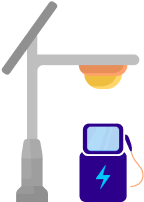EV charging has never been easier
At home
Convenient and cost-efficient, plug in your EV at night when energy is cheapest and wake up fully charged. Save up to 75% on fuel costs with Intelligent Octopus Go - EV Saver, compared to a standard variable tariff like Flexible Octopus.
On the go
The extensive public charging network makes the UK a great place to drive electric. There are more public EV charging stations than petrol stations, making it easy to keep your EV topped up on the go.
How long does it take to charge an EV?
The time it takes to charge an electric car depends on the where you're charging, the power of the charger, and the size of the car's battery.
In most cases, you'll be charging in one of three places; at home, at a long-stay car park (like a supermarket), or at a Rapid charger.
So, how long would it take to charge your EV at each of these charges? Let's use the Volkswagen ID.3 as an example...

On the motorway
32 minutes

At the supermarket
6 hours 15 minutes

At home
9 hours 30 minutes
1 / 3
How much does it cost to charge an EV?
The slower the charger, the less it costs to top up your battery.
Intelligent Octopus Go - EV Saver
Charge for only 6.5p/kWh
Introducing Intelligent Octopus Go - EV Saver, exclusive to Octopus EV drivers.
This discounted energy tariff saves you an extra 1p on off-peak rates - meaning you'll get six hours of guaranteed cheap energy for your home between 11:30pm and 5:30am.
Want to sign up? Either, switch to Intelligent Octopus Go (if you haven't already) or head over to MyAccount to link your Octopus Energy account.
Read more about the cost of charging in our blog.
Octopus Electroverse
Charging on the public network
It costs a little more to charge your EV at rapid chargers than at home. But Octopus Electroverse is working hard to keep public charging costs down. And, where possible, provide exclusive discounts. Use the Electroverse app to map out your journey and check the pricing of each charging station before you arrive.
Want to find out more about EV Charging?
We’ve got you covered. Head to our blog on all things EV charging.